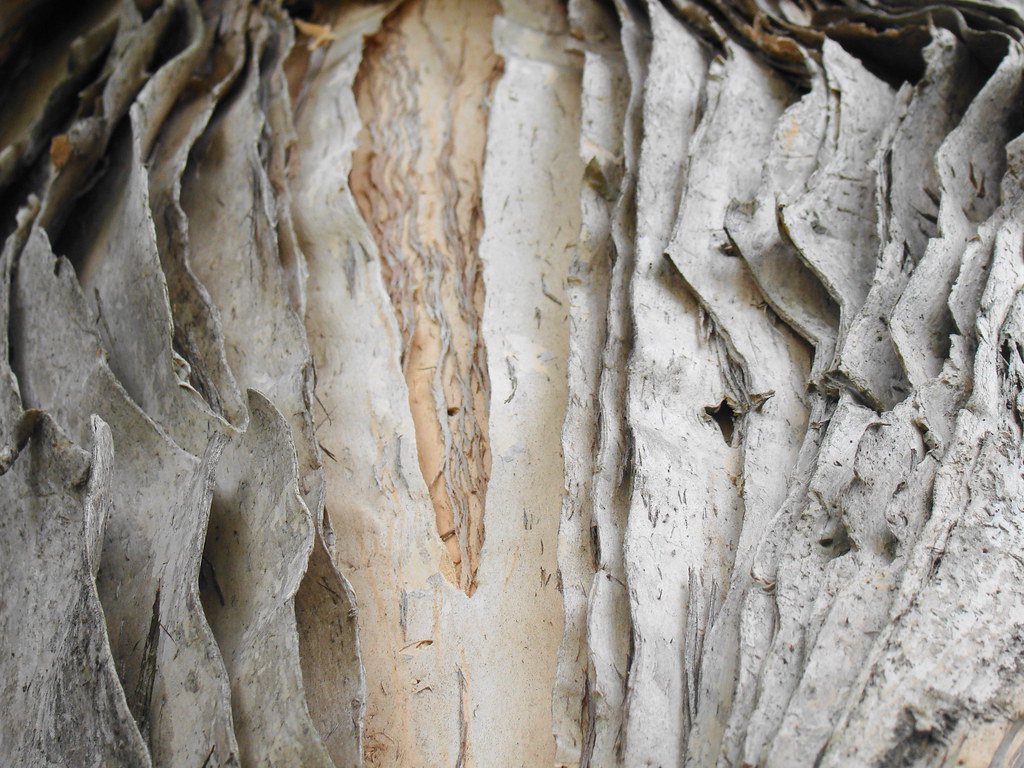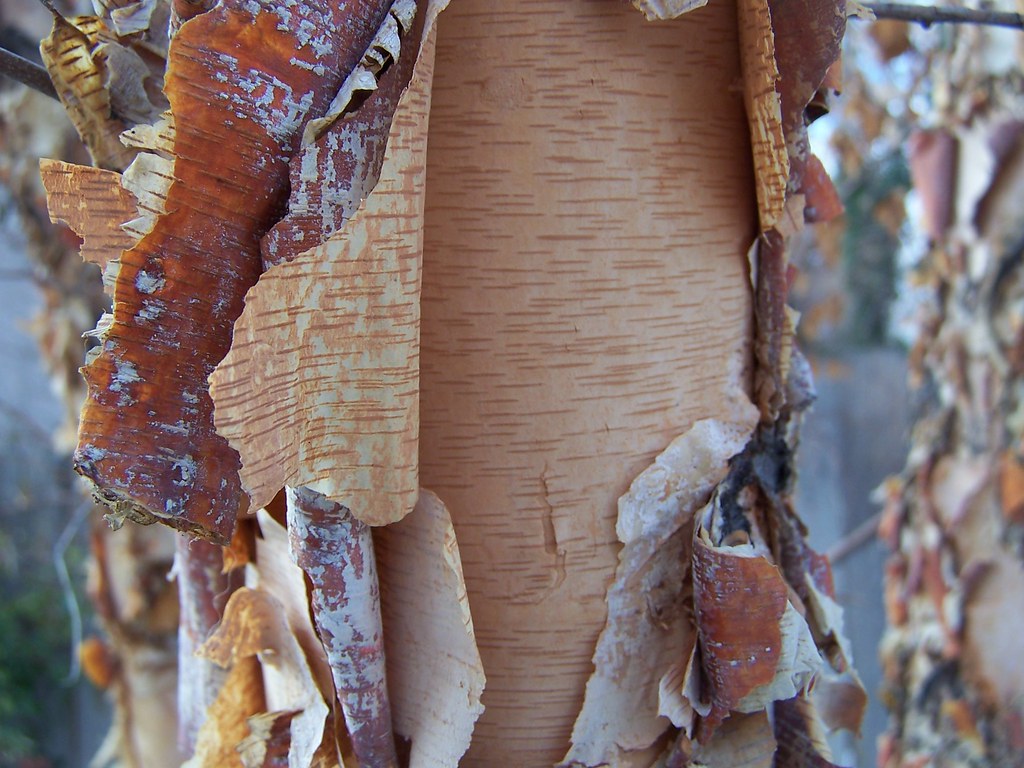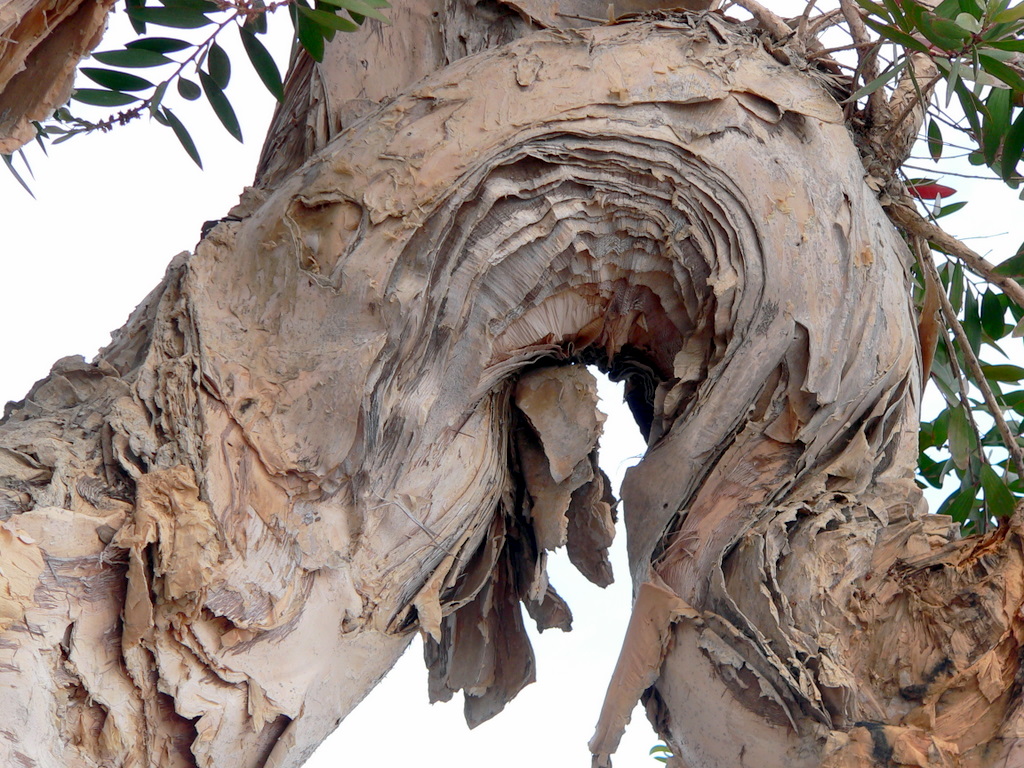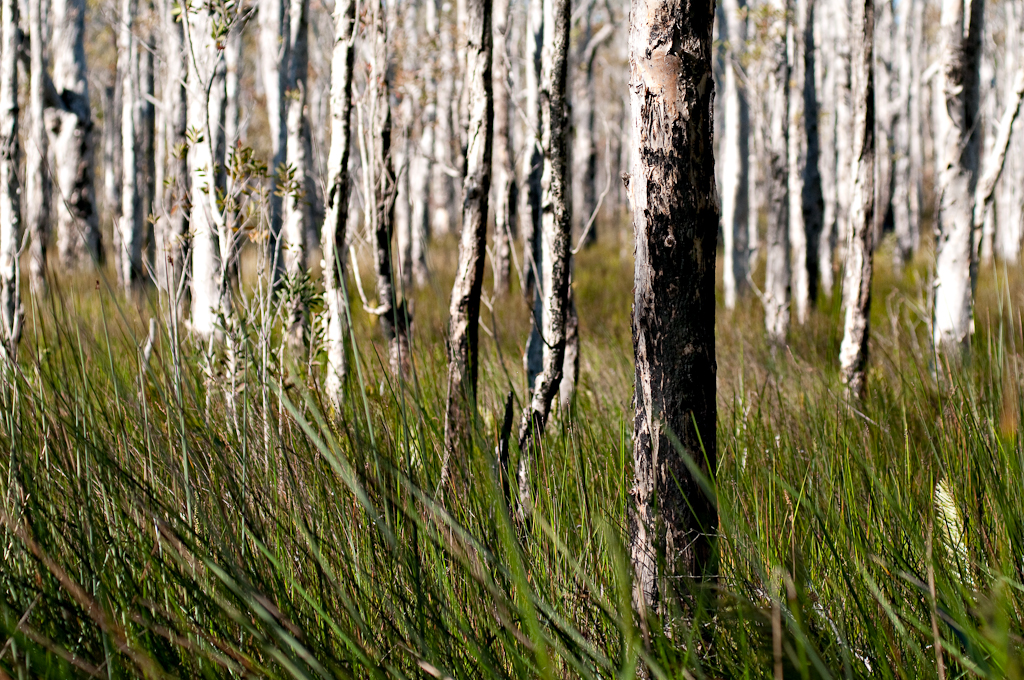.

Paper Bark tree (Melaleuca quinquenervia), Australian native, Sao Paulo, Brazil: photo by mauroguarandi, 29 November 2009
Some Relique of a Saint doth weare:
Who for some sweet-hearts sake, did prove
The fire, and martyrdome of love.
Here is the Legend of those Saints
That di'd for love; and their complaints:
Their wounded hearts; and names we find
Encarv'd upon the Leaves and Rind.
Give way, give way to me, who come
Scorch't with the selfe-same martyrdome:
And have deserv'd as much (Love knowes)
As to be canoniz'd 'mongst those,
Whose deeds, and deaths here written are
Within your Greenie-Kalendar:
By all those Virgins Fillets hung
Upon your Boughs, and Requiems sung
For Saints and Soules departed hence,
(Here honour'd still with Frankincense)
By all those teares that have been shed,
As a Drink-offering, to the dead:
By all those True-love-knots, that be
With Motto's carv'd on every tree,
By sweet S. Phillis; pity me:
By deare S. Iphis; and the rest,
Of all those other Saints now blest;
Me, me, forsaken, here admit
Among your Mirtles to be writ:
That my poore name may have the glory
To live remembred in your story.
Robert Herrick (1591-1674): To Groves, from Hesperides, 1648

Paper Bark Birch: photo by Aubrey Guymn, 16 December 2005

Paperbark Maple, Mendocino Botanical Gardens: photo by jidarius, 13 May 2010

Paperbark Tree: photo by Joel Bramley, 5 April 2013

Paper Bark Tree, Point Loma, California: photo by Lee Edwin Coursey, 13 April 2008

Paperbark wetland, Mungo Brush, Hawks Nest, New South Wales: photo by my_elbow, 22 July 2009

Paperbarks (Melaleuca quinguenervia) in wetland, Broadwater National Park, New South Wales: photo by dustaway, 19 July 2012

Paperbark Maple (Acer griseum), Brookside Gardens, Maryland: photo by John Winder, 18 November 2012



10 comments:
The mingling-together of details from Roman burial custom with Christian references represents a signature Herrick trick. In this form of serious play the history of all men and all women, of all lovers, is drawn as a ceremonial business, with poetic protocols as old as the civilized forest.
Herrick's figure of carving names into trees lends to reflection upon the physical-depth aspect of poetry, the memory of carving in it, its history as a form fixed by print; an inscription, a sinking-into-something.
....pity these have not
Trac'd upon vellum or wild Indian leaf
The shadows of melodious utterance...
This post carries on from Vicente Huidobro: Poetry Is a Celestial Transgression
NB. Immediate inspiration (paper bark) came from here.
Also by Herrick:
Robert Herrick: Life is the Bodies Light
Robert Herrick: Memorials of the Obscure
Robert Herrick: Silks
Robert Herrick: The comming of good luck
Tom,
Herrick's verses on still alive here, next to paperbark trees --quite fitting "That my poore name may have the glory/ To live remembred in your story."
4.21
blue whiteness of sky above still black
ridge, bird slanting across lower right
in foreground, wave sounding in channel
wrote he had “been for walk,”
“seen lots of things”
come to the surface as such
actual, i.e., present
cloudless blue sky reflected in channel,
shadowed green canyon of ridge above it
Steve, yes, that's so touching, isn't it. Especially when one remembers Herrick wasn't published at all, until he did it himself, late on, and then at the absolutely wrong moment, just as everything was falling apart.
So carving a poem into a tree would almost make sense, a kind of early "cottage" mimeograph-like form of production.
The seemingly-unsorted multitude of poems in Hesperides is famously without rhyme or reason in its sequencing, as though "ordered" by the pack-of-cards-flung-about-at-random method.
But a closer look, over the years, reveals small interesting propinquities.
"To Groves", for example, is preceded by this epigram:
Fame makes us forward
To Print our Poems, the propulsive cause
Is Fame, (the breath of popular applause.)
One has to wonder when that was writ (again, very few of the poems yield easily if at all to attempts at dating).
Early on, in London, most likely -- but the thought of the later isolation in "rocky Devon" also enters the mind.
"been for walk"
"seen lots of things"
(Paperbark trees share a native environment with eucalypti.)
Exquisite.
Sometimes I wonder who will be remembered from our time. I assume a disconnect between fame and longevity . . .
The images of bark are magical.
Give way, give way to me, who come
schorch't with the selfe-same martyrdome.
Me, me, forsaken, here admit
among your mirtles to be writ.
Who'd have the wit and the modesty to make such effective use of self assertion now? That light irony at work!
And suddenly she was sitting in an airplane back to Waitpinga. Couldn't wait to see the paper barks again.
Thank you so much, Tom! I am hoping Vizma will drop in to see this post! She will be very happy to be an inspiration on your blog. Engraving a poem on a tree, that's like writing your words on hundreds of compacted sheets of papers. It's like multiplying your words. Exponential writing. But then the years strip them down one by one. It's a trade-off...
It would be pleasant to think it's all been carv'd into the Paperbark Book of Days, the wit and the modesty and the magic, all the elements of Herrick's great gift -- and for that matter even a smidgeon of the longevity -- though that last quality's of course down to us to protect, and if we (people who at least still pretend to care about poetry) lose the good sense to appreciate fine things (has it already been lost?), those things will lose their longevity the instant the last remembrer loses her or his memory of them. Until then, exquisite's the word certainly, for the thing itself, when it's as good as this -- and grateful, for us.
The arts and skills required to make such delicate beautiful things were gained once by discipline and hard work and love. Herrick was apprenticed as a goldsmith and thus trained in the arts of the bright bit of filigree and the hard-won finishing touch, studied his classics by candle light for the sheer fascination to be found in elegant and exacting figuration, and took up poetry under the generous and congenial scholarly mentorship of a grand tavern master named Ben Jonson. That was in the geological epoch before Flarf, Metapoetics and the Universal Conquest of Instant Smartphone Post-Avant Administered Know-Nothingism.
Ah how lovely to think of flying away homeward to the paperbark groves and the beaches of Waitpinga, home of the winds...
On the sand of Waitpinga
Turkey wings and bubbles
in glasses
Watch up
the moon in trail of
stars unscattered,
just a trail above you
North to South
trees are barking paper,
The Windy Place has lost its voice
Thanks Marie for directing me here, and thank you too Tom, what a lovely surprise!
So interesting to learn about Herrick, that he trained as a goldsmith, which was also my vocation for years. Given the choice, I'd much rather work with paperbark than gold.
Beautiful poem about your first night at Waitpinga, Marie...we were so lucky to experience such stillness.
Post a Comment